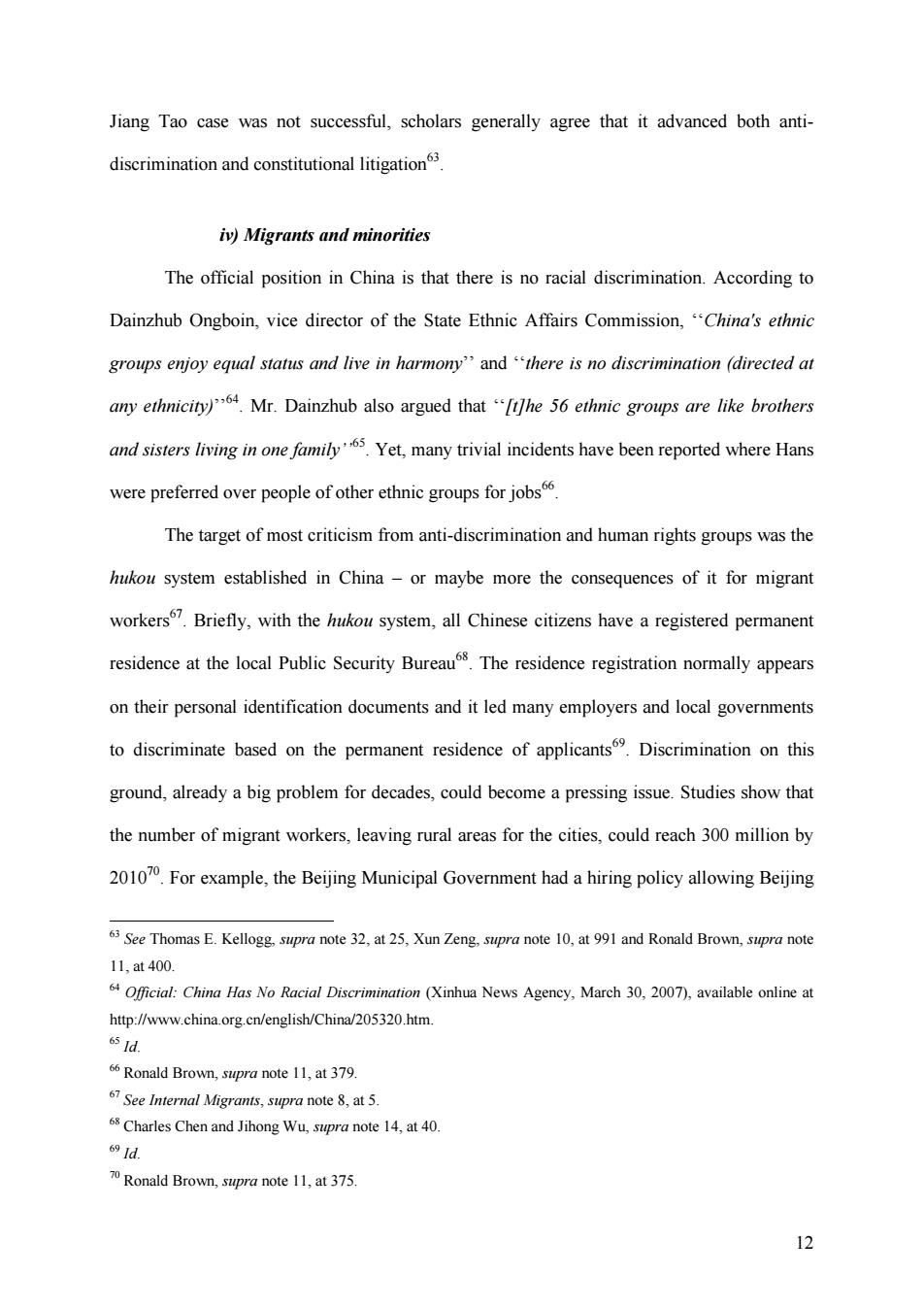正在加载图片...

Jiang Tao case was not successful,scholars generally agree that it advanced both anti- discrimination and constitutional litigation iv)Migrants and minorities The official position in China is that there is no racial discrimination.According to Dainzhub Ongboin,vice director of the State Ethnic Affairs Commission,China's ethnic groups enjoy equal status and live in harmony andthere is no discrimination (directed at any ethnicity)Mr.Dainzhub also argued that"[tThe 56 ethnic groups are like brothers and sisters living in one family5.Yet,many trivial incidents have been reported where Hans were preferred over people of other ethnic groups for jobs The target of most criticism from anti-discrimination and human rights groups was the hukou system established in China -or maybe more the consequences of it for migrant workers57.Briefly,with the hukou system,all Chinese citizens have a registered permanent residence at the local Public Security Bureau The residence registration normally appears on their personal identification documents and it led many employers and local governments to discriminate based on the permanent residence of applicants9 Discrimination on this ground,already a big problem for decades,could become a pressing issue.Studies show that the number of migrant workers,leaving rural areas for the cities,could reach 300 million by 201070.For example,the Beijing Municipal Government had a hiring policy allowing Beijing See Thomas E.Kellogg.supra note 32,at 25,Xun Zeng,supra note 10,at 991 and Ronald Brown,supra note 11,at400 64 Official:China Has No Racial Discrimination (Xinhua News Agency,March 30,2007),available online at http://www.china.org.cn/english/China/205320.htm. 651d. 6 Ronald Brown,supra note 11,at 379. 6See Internal Migrants,supra note 8,at 5. 68 Charles Chen and Jihong Wu,supra note 14,at 40. 691d. 70 Ronald Brown,supra note 11,at 375. 1212 Jiang Tao case was not successful, scholars generally agree that it advanced both antidiscrimination and constitutional litigation63 . iv) Migrants and minorities The official position in China is that there is no racial discrimination. According to Dainzhub Ongboin, vice director of the State Ethnic Affairs Commission, ‘‘China's ethnic groups enjoy equal status and live in harmony’’ and ‘‘there is no discrimination (directed at any ethnicity)’’64 . Mr. Dainzhub also argued that ‘‘[t]he 56 ethnic groups are like brothers and sisters living in one family’’65. Yet, many trivial incidents have been reported where Hans were preferred over people of other ethnic groups for jobs66 . The target of most criticism from anti-discrimination and human rights groups was the hukou system established in China – or maybe more the consequences of it for migrant workers67. Briefly, with the hukou system, all Chinese citizens have a registered permanent residence at the local Public Security Bureau68. The residence registration normally appears on their personal identification documents and it led many employers and local governments to discriminate based on the permanent residence of applicants69. Discrimination on this ground, already a big problem for decades, could become a pressing issue. Studies show that the number of migrant workers, leaving rural areas for the cities, could reach 300 million by 201070 . For example, the Beijing Municipal Government had a hiring policy allowing Beijing 63 See Thomas E. Kellogg, supra note 32, at 25, Xun Zeng, supra note 10, at 991 and Ronald Brown, supra note 11, at 400. 64 Official: China Has No Racial Discrimination (Xinhua News Agency, March 30, 2007), available online at http://www.china.org.cn/english/China/205320.htm. 65 Id. 66 Ronald Brown, supra note 11, at 379. 67 See Internal Migrants, supra note 8, at 5. 68 Charles Chen and Jihong Wu, supra note 14, at 40. 69 Id. 70 Ronald Brown, supra note 11, at 375